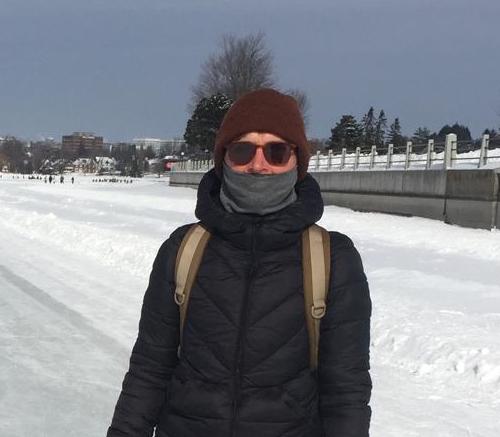Notre équipe.
ENTRETIEN AVEC
JACKIE DAWSON
Nos collaborateurs
Étudiants
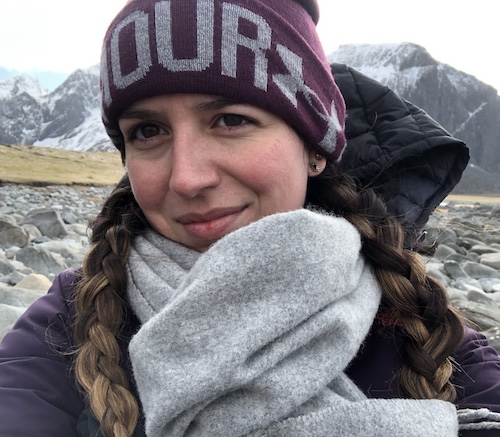
Melissa Weber
Doctorante
Melissa Weber mène ses recherches de doctorat sur le développement touristique lié au lieu historique national des épaves du HMS Erebus et du HMS Terror, près de la communauté de Gjoa Haven, au Nunavut. Melissa a collaboré avec deux autres communautés du Nunavut (Coral Harbour et Iqaluit) dans le cadre du projet Couloirs de l’Arctique et voix du Nord. Ses recherches portent surtout sur le tourisme maritime, la politique maritime et la navigation dans l’Arctique.
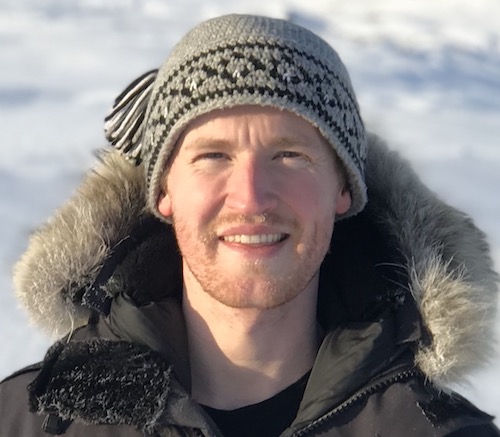
Andrew Orawiec
Doctorant
Andrew a commencé à travailler dans l’Arctique en 2014, lorsqu’il a accepté un poste au gouvernement du Nunavut à Iqaluit. Il a brièvement quitté le Nord pour terminer une maîtrise en sciences de la gestion durable à l’Université de Toronto qui portait principalement sur le voyage inaugural du Crystal Serenity dans le passage du Nord-Ouest. Après ses études de maîtrise, Andrew est retourné travailler au Nunavut, en se concentrant alors sur les enjeux de politique maritime. À l’automne 2018, il a déménagé à Ottawa pour commencer ses études de doctorat, tout en continuant de participer à diverses initiatives liées au domaine maritime au Nunavut.
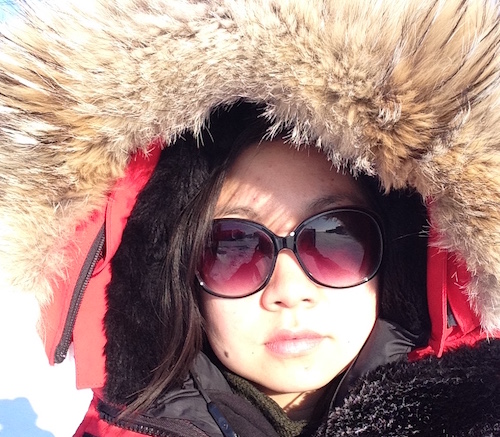
Gloria Song
Doctorante en droit
Gloria Song est doctorante à la Faculté de droit de l’Université d’Ottawa, et ses travaux portent sur les enjeux entourant l’accès à la justice au Nunavut. Anciennement avocate en droit des pauvres à Cambridge Bay, au Nunavut, elle travaille actuellement à Savoir polaire Canada comme analyste des politiques pour appuyer la coopération scientifique internationale dans l’Arctique. Elle est également coordonnatrice de projet pour le Barreau du Nunavut.
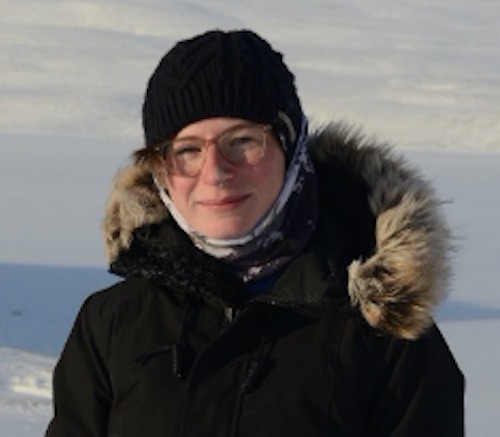
Kayla Grey
Étudiante à la maîtrise
Kayla a obtenu son baccalauréat ès sciences spécialisé en sciences environnementales à l’Université d’Ottawa en 2014. Elle poursuit actuellement des études à la maîtrise en géographie avec Jackie Dawson tout en continuant de travailler pour Laurie Chan à titre de coordonnatrice d’un programme de formation en toxicologie intitulé REACT dans le cadre du programme FONCER du CRSNG. La recherche de Kayla s’appuie sur une analyse par modèles des données environnementales, biologiques et de navigation pour produire une estimation des risques attendus de l’introduction d’organismes provenant des salissures de coques dans l’Arctique canadien, en particulier ceux qui sont potentiellement des espèces envahissantes. Ce projet lui permet de poursuivre ses activités de recherche dans les domaines de la biologie de conservation et des systèmes d’information géographique.
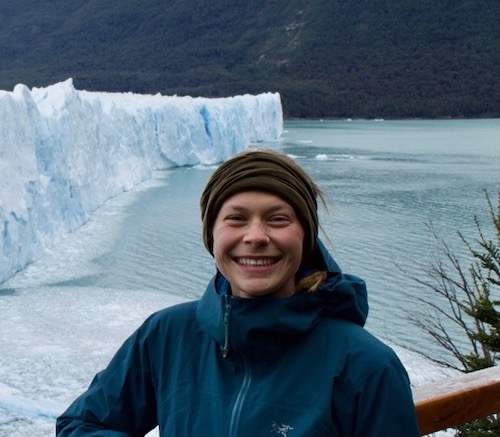
Annika Stensland
M.Sc. Student
Annika Stensland is currently pursuing an M.Sc. in Environmental Sustainability within the Institute of the Environment at the University of Ottawa. She completed a B.A. in International Relations from the University of British Columbia in 2018. Annika’s current research interests focus on the human dimensions of climate change on a community level, with a particular interest in last-chance tourism. Additional research interests include environmental policy, interweaving Indigenous and western systems of knowledge, and social change and innovation.
Diplômés
Alison Cook (bourse postdoctorale), Arctic shipping and climate change, 2018 – 2020
Nathan Debortoli (bourse postdoctorale), Climate change and transportation, 2019 – 2020
Zuzanna Kochanowicz (M.Sc.), Evaluating ecological risks from shipping in Lancaster Sounds, Canada, 2017 – 2020
Dr. Julia Olsen (Ph.D), Arctic maritime activities in changing conditions: Community perspectives, 2015 – 2020
Dr. Marta Bystrowska (Ph.D.), Cruise tourism and climate change in Svalbard, Greenland, and Canada, 2015 – 2019
Holly Gordon (M.Sc), Arctic shipping risks for local communities in the Northwest Passage, 2018 – 2019
Jamie D’Souza (M.A.), The Implications of Climate Change for Polar Bear Viewing Tourism in Churchill Canada, 2017 –2019
Manuelyn Perelta (M.A.), Climate justice in international climate change negotiations, 2016 –2019
Annika Ogilvie (M.Sc.), Improving Understanding of Factors Contributing to Pressured Ice in the Hudson Strait, Canada: an interdisciplinary analysis of resource ship besetments, 2015 –2019
Larissa Pizzolato (M.Sc.), Spatial vulnerability of sea ice and Arctic shipping activities in Canadian Arctic Waters, 1990-2012, 2013 - 2015
Pierre-Louis Têtu (bourse postdoctorale), 2016- 2019, Arctic shipping risks and spatial trends.
Dr. Marta Bystrowska (Ph.D.), 2015- 2019, Cruise tourism and climate change in Svalbard, Greenland, and Canada
Jenna Joyce (M.Sc), 2015 – 2018, Local marine use patterns in Arctic Canada: Infusing local knowledge into the northern marine transportation corridors. http://dx.doi.org/10.20381/ruor-22039
Flavia Craciun (M.Sc), 2016- 2018, Isolation, popularity and climate change: How planning policies affect the resilience of Arctic communities.
Magalie Quintal-Marineau (bourse postdoctorale), 2016- 2018, Inuit women and the socioeconomic development of northern communities, Quebec and Nunavut
Catherine Caldwell (M.A.), 2015- 2017, Consideration of climate change and the social impacts of resource development in decision-making.
Olivia Mussells (M.Sc.), 2013- 2015, Ice conditions in the Canadian Arctic during winter: A shipping and operational assessment. http://dx.doi.org/10.20381/ruor-2686
Alexandra Abram (M.Sc.), 2014- 2015, Impact of Arctic shipping on marine mammal migration.
Jessica Jaja (M.A.), 2012- 2014. Beyond climate change theory: What contributes to adaptive capacity in Caribbean small island developing states? http://dx.doi.org/10.20381/ruor-2853
Roger Ritsema (M.A.), 2012- 2014, Adapting to rapid environmental and economic change in Nunavut: How do local communities leverage opportunities to create economic self-sufficiency? http://dx.doi.org/10.20381/ruor-6510














